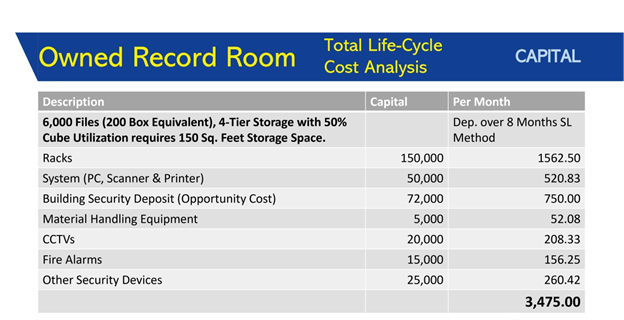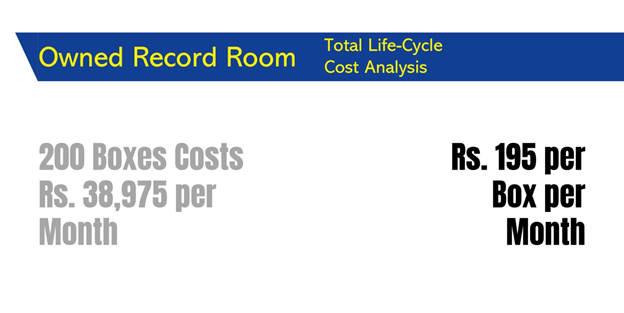TRUSTED RECORD MANAGEMENT SERVICES
KAYMAN Records Management is an ISO 9001:2015 Certified Records Management Company
Documenting Peace of Mind

Benefits Of storing Files in
KAYMAN Records Storage Facility
Door Step Pickup & Delivery of Files
Scientific Indexing of Records
Quick Retrieval of Documents
Secure Scanning & Digitization
Consult With Experts
Why should you not delay Records Management?
- Companies - Big or small - Records retention is must by Law, Compliance & Statutory purposes
- Value is immaterial - availability is a must
- Disaster need not be abrupt, could be simmering for some time now
- Lower than your current expenses / Return on Investment is High
Why Choose KAYMAN Records Management Services?
- Customised Records Management Solution to suit your Business
- Track and manage the entire life cycle of your records
- Strict adherence to Safety, Security & Accessibility
- Process Excellence, Scientific and systematic approach
- Documenting peace of mind
What is the cost of storing Records?
Count of Boxes Type of indexing Process Performed Digitisation, etc
Records Management Services We Offer
KAYMAN is one of the leading Records Management Companies in Chennai that offer holistic records management services.
Records and Documents Storage Services
- Store your records at our secure offsite document storage facility.
- Retrieve physical records on-demand
- Retain records as long as needed by regulatory compliances
- Pay only for what you store
- Scale your business records storage to any extent
Records Digitization & Scanning Services
- Go paperless with records digitization services
- Extend the life of physical records with document scanning services
- Turn business records, documents & images into searchable records
- Streamline documents for easy retrieval and distribution
- Meet compliance and ensure business continuity
Document Shredding Services
The cost of storing records depends on the following factors.
- Maintain clean workspaces with shredding services
- Securely dispose off records at our records storage facility
- Prevent manipulation of historical records
- Make use of our Industrial-grade shredders
- Get certificate of destruction for compliance records
What our customers are Saying?
KAYMAN is one of the few Document Storage Companies in Chennai that caters to multiple industry clients for various records management services.
We rely on KAYMAN records management for our records storage. They are professionals in the information management discipline.
CFO
Leading Packaging Company
Our huge pile of records is efficiently scanned and digitized with Kayman Records Digitization Services. Helps us very much to maintain clean offices.
General Manager
Leading Logistics Company
KAYMAN helps us with Medical Records Storage. Medical documents storage is critical for meeting compliance. We digitize our medical files as well.
CFO
Leading Healthcare Company
FAQs
Monthly Basis - Your files are stored in standard sized Records Management boxes and the charges are based on the count of boxes that are stored.
A Records Management box can hold 4-5 Box files or 25 - 30 Flat files (File size does matter)
We provide Doorstep Pickup & Delivery of Files
No Security deposits. No Hidden charges. - Pay for what you use
Store, safe and securely at 1/3 of the cost of renting a Flat or an Apartment
Get A Free Survey And Budgetary Estimate
The Veiled Expense in Records Management
Businessperson at work: professional confident office clerk searching files in the filing cabinet
Records Management is to help the organization to keep necessary documents accessible for both business operations and compliance audits.
Records management activities include creation, receipt, maintenance, use, and disposal of records. A record is content that documents a business transaction. Documentation may exist in contracts, memos, paper files, electronic files, reports, emails, videos, instant message logs, or database records. Paper records may be stored in physical boxes on-premises or at a storage facility. Digital records may be stored on storage media in-house or in the cloud.
As per the ‘records management standards’ ISO 15489.1, a record is defined as ‘information created, received, and maintained as evidence and information by an organization or person, in pursuance of legal obligations or in the transaction of business. ISO 15489.1 also defines records management as the ‘field of management responsible for efficient and systematic control of the creation, receipt, maintenance, use, and disposition of records, including processes for capturing and maintaining evidence of information about business activities and transactions in the form of records’.
How Do Companies Typically Manage Records?
Each industry should store its documents for a specific period of time, let’s see below for hospitality.
Hospitality
Under HIPAA, any HIPAA-related records (such as implementing new protection measures for PHI) need to be stored for six years. The Centers for Medicare & Medicaid Services requires that records of costs submitted to federal healthcare programs be kept for five years from the time they were created.
If you’re dealing with a work accident, OSHA stipulates that any record of treating an employee’s workplace injury be held for the entire time that employee works for that employer plus an additional 30 years. Veterans’ records typically have to be stored for 75 years, unless they are mentally incompetent at the time of treatment. In that case, the record has to be kept forever.
Finally, a recent court ruling found that medical practices can be sued for making a false claim to a federal healthcare program up to 10 years after it happened. So, healthcare providers that deal with federal healthcare programs have to retain records for 10 years to avoid legal trouble. You also have to keep any medical records that relate to an active lawsuit or legal action.
The Risks Associated with Owned Records Management Facility
Garbage In, Garbage Out
The first risk you may be taking focuses on ensuring quality. If you’re not being diligent enough about records management protocols, this apathy could come back to bite you. You’ve probably heard the old adage, “Garbage In, Garbage Out”? And this certainly applies here. Good records management begins with good information capture and filing, especially in today’s fast-paced, document-filled world. If you’re not structured in the data you record, its accuracy, storage locations, and versioning controls, your entire system can quickly descend into chaos. In fact, in a recent survey, 79% of survey respondents reported that they create new documents in their jobs at least several times a week, and 59% of them create them daily or continuously.
Mishandling of Information
Even your most reliable workers can expose your organization to legal and compliance risks by unintentionally mishandling documents. For example, have you ever found an important form on the copy machine at the office? Or give files to a co-worker without first checking their permissions? Or maybe you know someone who has thrown away a document or record that was either retained or securely shredded? These errors can put you and your organization at risk.
Regulatory Fines & Penalties
Whether you manage medical records, legal records, or other forms of personal and financial information, the key is solid document retention policy. Without it, you risk being fined significantly, especially if you destroy records too soon or can’t produce them during an audit. You could also incur more risk than you should in legal discovery or an at-fault breach by keeping records beyond their retention dates. One example of this happened a few years back to Pacific Gas & Electric Co. when CPUC fined them $24.3 million due to poor records management. That’s an expensive lesson to learn.
Damage During Disasters
Natural disasters, floods, and fire can wreak havoc on a business, destroying improperly stored documents forever. Critical and irreplaceable records should be stored in climate-controlled underground vaults and in professional records centers in locations chosen for minimized environmental risks.
Time & Efficiency Loss
When organizations inefficiently file and manage records, they risk lost time and productivity when employees are forced to track down the information they need to complete tasks. All this time and energy add up to real costs that hit your bottom
line. In fact, some workers claim to spend as much as 15% of their workweek hunting down lost paper documents.
How Can You Save 90% of Cost with Kayman Records Management?


 The above charts clearly explain that you can save 90% of the cost with Kayman records management solution.
Benefits of Using Kayman Records Management Facility
The above charts clearly explain that you can save 90% of the cost with Kayman records management solution.
Benefits of Using Kayman Records Management Facility
 The main benefit of using kayman records management facility is cost Minimization if you have your own records management you will be spending Rs.195 per box per month, but if you are using Kayman RMS you will be spending just Rs. 15 per box per month.
The main benefit of using kayman records management facility is cost Minimization if you have your own records management you will be spending Rs.195 per box per month, but if you are using Kayman RMS you will be spending just Rs. 15 per box per month.

